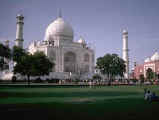|

 History History
The Indus Valley civilization, India's earliest known civilization
(2500-1700 BC), is identified by its interesting culture as well as its
artifacts. The strength and basis of Hinduism is attributed to the Vedic
culture (about 1500), as well as the origin of the caste system.
India has had many different influences throughout its history due to the
migration, invasion or expansion of other nations. Some of these nations
or people who influenced India include the Mongols (under the direction of
Genghis Khan), the Greeks (Alexander the Great), and the British.
India was a wealthy country, economically and culturally up until British
colonization. Europeans would trade with India for spices or cotton
textiles, but when the British colonized the country the economy declined.
This was due in part to exploitation and destruction of India's industries and
wealth.
Eventually, India would be granted its independence again in 1947, after
which a slow progression has been seen in its development.
Present-day India has made significant headway in large-scale
industrialization. As a result, India has become one of the top five
industrialized nations of the world. It produces every conceivable industrial
item and consumer goods, and has achieved significant success in frontier
scientific research including peaceful application of nuclear energy, space and
satellite research, communication technology and biotechnology. India also has
the third largest reservoir of scientific and technological manpower. Pioneering
scientists such as Nobel laureate C. V. Raman, Homi Bhaba, J.C.Bose, Satyen Bose,
Nobel laureates Hargovind Khorana and S. Chandrasekhar have won laurels for
India both at home and abroad.
Historically India is an ancient land with a continuous civilization of 5000
years. The Indus valley civilisation (3000 BC to 1500 BC) was followed by the
Sanskrit-speaking Vedic period (1500 BC to 500 BC). The first of the Indian
empires, the Mauryan empire began shortly after Chandragupta Maurya (274-237
BC). The post-Asoka empires were followed by empires of the Gupta, Pratihara,
Pala, Chalukya, Chola, Pandya dynasties. Subsequently, around the 9th century,
the Muslim period was established followed by the arrival of the Europeans,
mostly British in the 17th century.
On August 15, 1947 India attained independence. It adopted a parliamentary
system of government with a union of states proclaiming itself to be a Sovereign
Democratic Republic.
The country has been divided into 25 States and 7 Union Territories. The
States have considerable autonomy of their own while the Union Territories are
governed by the President through appointed administrators. At the village level
one finds the system of Panchayati Raj. It is a pattern of self-government that
oversees the planning and execution of projects in district, block and village
levels. Adult suffrage is universal.
India's national flag is a horizontal tri-color of deep saffron at the top,
white in the middle and dark green at the bottom in equal proportion. In the
center of the white band is a wheel, which appears on the abacus of the Sarnath
Lion seal of Asoka.
CIA fact
The Indus Valley civilization, one of the
world's oldest, flourished during the 3rd and 2nd millennia B.C. and extended
into northwestern India. Aryan tribes from the northwest infiltrated onto the
Indian subcontinent about 1500 B.C.; their merger with the earlier Dravidian
inhabitants created the classical Indian culture. The Maurya Empire of the 4th
and 3rd centuries B.C. - which reached its zenith under ASHOKA - united much of
South Asia. The Golden Age ushered in by the Gupta dynasty (4th to 6th centuries
A.D.) saw a flowering of Indian science, art, and culture. Islam spread across
the subcontinent over a period of 700 years. In the 10th and 11th centuries,
Turks and Afghans invaded India and established the Delhi Sultanate. In the
early 16th century, the Emperor BABUR established the Mughal Dynasty which ruled
India for more than three centuries. European explorers began establishing
footholds in India during the 16th century. By the 19th century, Great Britain
had become the dominant political power on the subcontinent. The British Indian
Army played a vital role in both World Wars. Nonviolent resistance to British
rule, led by Mohandas GANDHI and Jawaharlal NEHRU, eventually brought about
independence in 1947. Communal violence led to the subcontinent's bloody
partition, which resulted in the creation of two separate states, India and
Pakistan. The two countries have fought three wars since independence, the last
of which in 1971 resulted in East Pakistan becoming the separate nation of
Bangladesh. India's nuclear weapons tests in 1998 caused Pakistan to conduct its
own tests that same year. In November 2008, terrorists allegedly originating
from Pakistan conducted a series of coordinated attacks in Mumbai, India's
financial capital. Despite pressing problems such as significant overpopulation,
environmental degradation, extensive poverty, and widespread corruption, rapid
economic development is fueling India's rise on the world stage. In January
2011, India assumed a nonpermanent seat in the UN Security Council for the
2011-12 term.
Back to Top
Other
Related Sites...
|









